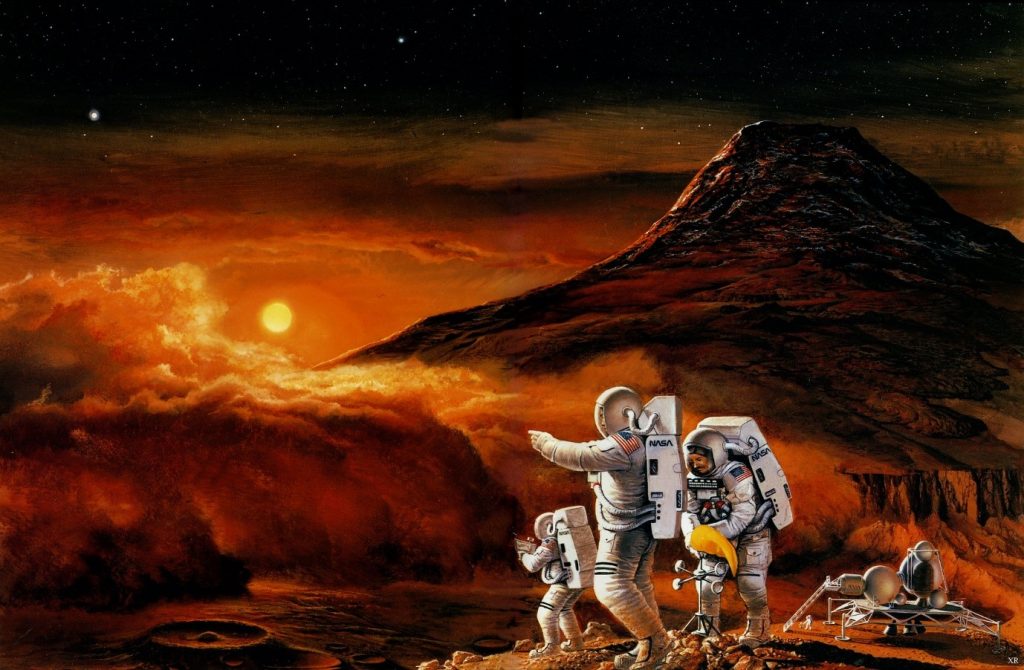This post is also available in Dutch .
A manned mission to Mars is being planned for 2030. Going to Mars presents enormous challenges to human endurance, both physically and psychologically. Curious as to why?
Space is hostile
A previous blog post talked about the effects of space travel on the human body. There we learned that our bodies can cope quite well with extreme conditions. The preparation for a voyage to Mars is currently under way. However, the space mission to the Red Planet is unlike any previous voyage.
Mars is on average 140 million miles (225 million kilometers) from Earth while the Moon, in comparison, is “only” 0.239 million miles away. It would take around 9 months to reach Mars and the same amount of time to return to Earth. So, 18 months are needed just for the journey itself. This is 3 times longer than the average duration that an astronaut currently spends in space (6 months). The longest space travel in history lasted almost 1 year, which is still much shorter than the estimated time for a Mars expedition. Why is that? The constraints on the duration that one can spend in space stem from the risks associated with a virtually gravity-free environment and space radiation, among other factors.
Effects on the body
Mars has one third Earth’s gravity. This can have serious consequences for one’s health. Without gravity, bones start to lose minerals at a rate of about 1% per month. In comparison: the rate of bone loss for the elderly on Earth ranges from 1% to 1.5% per year. As the bones weaken, it is more likely that they will break in the case of a fall. This can be compared to people who, as a consequence of aging, develop osteoporosis. Indeed, research suggests that the effects of microgravity are somewhat comparable to changes that happen to the body when one ages. In addition to brittle bones, a near zero-gravity environment can cause distorted vision. Impairments to vision happen because of the dysregulation of the fluid pressure within the eyes. Microgravity makes the fluids in the body shift (on Earth, fluids are pulled toward the feet) which affects the blood vessels in the eye.
As for the increase in radiation — an astronaut receives more than ten times the Earth’s radiation — it can have damaging effects on the central nervous system. This then results in changes in motor and cognitive function and, leads to fatigue, negative mood and difficulty sustaining attention. Cosmic radiation has also been associated with an increased risk for cancer and heart disease.
Effects on the mind
An extended mission can have psychological effects, too. These psychological effects arise from isolation, confinement, sleep deprivation (because of continuous exposure to office-like dim light and noise), working under intense pressure, and interacting with a limited number of people (one’s crewmembers). All of these can lead to problems ranging from minor ones, like irritability and nervousness, to more severe issues, such as depression and anxiety.
Not only a challenge to the human body and mind
Long trips to deep space are clearly a challenge for the human body and mind. Yet, scientists think that we can push the boundaries in the future. There is however another limitation, which currently limits space travel: technology. With the current state of technology, destinations that are even further away than the Red Planet are out of reach. That means that we still have some big steps left in order to achieve the goal of long-term space exploration.
Original language: English
Credit
Leading image by James Vaughan via Flickr (CC BY-NC-SA 2.0)
Author: Julija Vaitonyte
Buddy: Eva Klimars
Editor: Mónica Wagner
Translator: Floortje Bouwkamp
Editor Translation: Felix Klaassen
